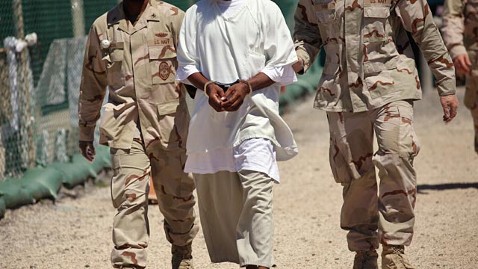Justice Dept. Document Details Guantanamo Prisoner Names, Status

Image credit: John Moore/Getty Images
With transparency in the national spotlight, the Obama administration named the 46 Guantanamo detainees being held indefinitely and the detention status of all 166 prisoners.
Though the names of the Guantanamo detainees have been public for years, the Justice Department list released Monday identified for the first time the 46 prisoners deemed too dangerous to be released and unable to be prosecuted in court.
The detention status of all 166 prisoners also remained unclear until the release of the list.
In response to a Freedom of Information Act lawsuit filed by the Miami Herald, the document detailed which prisoners should be referred for prosecution, transferred outside the U.S., or held indefinitely without charge under the Authorization for Use of Military Force Act.
The recommendations come from the task force created by President Obama in 2009 to review the status of detainees within the controversial Cuba-based military detainment and interrogation facility.
Of those held indefinitely, the 15-page report showed 26 were from Yemen, 12 were from Afghanistan, three were from Saudi Arabia, two were from Kuwait, two were from Libya, and one each was from Kenya, Morocco and Somalia.
Activist groups cautiously welcomed the report, saying the list was illuminating but overdue.
"It is fundamental to democracy that the public know the identities of the people our nation is depriving of liberty and why they are being detained," said Human Rights First's Dixon Osburn in a statement. "Today's revelation is welcome, though long overdue."
The ability of the government to file charges against some of the inmates is complicated by factors such as congressionally imposed restrictions on using civilian courts, federal court-imposed restrictions on military commissions filing specific charges, and evidence being obtained by questionable means of interrogation such as waterboarding.
Transfers of lower level detainees out of the prison to other countries halted in 2011 when Congress amended the National Defense Authorization Act to include heavy restrictions on the transfers.
A hunger strike currently plagues the prison, with guards having strap down as many as 104 of the 166 inmates and force-feed them liquid food through nasal tubes, according to the Associated Press.
President Obama recently reiterated his commitment to pursue his unfulfilled promise of closing the prison, appointing Washington lawyer Cliff Sloan as a State Department special envoy to spearhead the effort to shutter the facility.